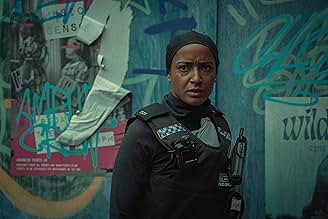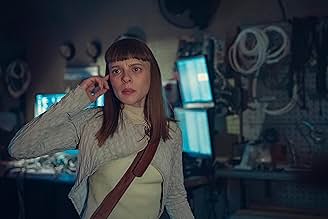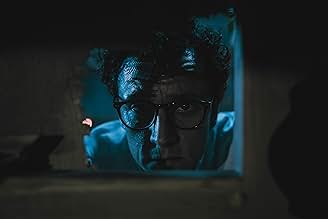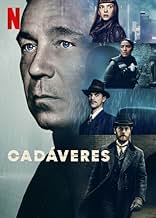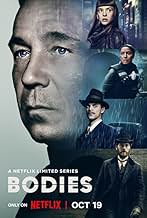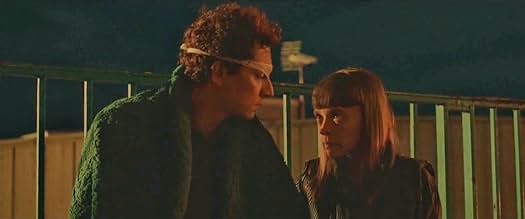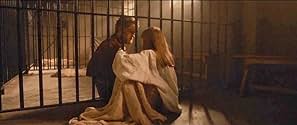Vier Detektive in vier verschiedenen Zeitepochen Londons ermitteln in demselben Mordfall.Vier Detektive in vier verschiedenen Zeitepochen Londons ermitteln in demselben Mordfall.Vier Detektive in vier verschiedenen Zeitepochen Londons ermitteln in demselben Mordfall.
- Nominiert für 1 BAFTA Award
- 1 Gewinn & 6 Nominierungen insgesamt
Folgen durchsuchen
Empfohlene Bewertungen
I am enjoying the series, if I close my eyes during the gorey scenes where history is being mutilated....
It's impossible to be 100% accurate, but sometimes the mistakes are distracting. Like many contemporary productions, this series fails to understand how people behaved in the past. There are two instances in particular that particularly stand out.
In 1890 London, the molly house with two men dressed up in corsets on the street simply wouldn't have happened in daylight in front of the police because they would have been immediately arrested. It wasn't okay to act gay in any way in public in 1890.
The other most egregious errors occur in the 1941 blitz scenes, with people screaming and running for shelter from their apartments while bombs are falling in the neighbourhood, and the crowds then being denied access to an underground station for shelter. Anyone who has ever talked to anyone who lived in London during the Blitz knows that Londoners were prepared and calmly resigned to the bombings. There were usually many minutes between the first alerts and the first bombs - enough time to make a thermos of tea and dress warmly. There were also alternate street-level shelters to the undergrounds, and many people just defied fate and waited it out at home. As well, the cars have too much light being projected from the head lamps, and the detective's apartment had no blackout curtains, so sitting in the apartment with the lights on was illegal, and he would have been fined or arrested. Covering light from windows would have been tested in drills by ARP officers from the home army in the early months of the war, well before the Blitz began.
It's too bad these blatant errors exist because they pull down the quality of the production. Period set films really need historians to check basic facts, and directors need to LISTEN to them.
It's impossible to be 100% accurate, but sometimes the mistakes are distracting. Like many contemporary productions, this series fails to understand how people behaved in the past. There are two instances in particular that particularly stand out.
In 1890 London, the molly house with two men dressed up in corsets on the street simply wouldn't have happened in daylight in front of the police because they would have been immediately arrested. It wasn't okay to act gay in any way in public in 1890.
The other most egregious errors occur in the 1941 blitz scenes, with people screaming and running for shelter from their apartments while bombs are falling in the neighbourhood, and the crowds then being denied access to an underground station for shelter. Anyone who has ever talked to anyone who lived in London during the Blitz knows that Londoners were prepared and calmly resigned to the bombings. There were usually many minutes between the first alerts and the first bombs - enough time to make a thermos of tea and dress warmly. There were also alternate street-level shelters to the undergrounds, and many people just defied fate and waited it out at home. As well, the cars have too much light being projected from the head lamps, and the detective's apartment had no blackout curtains, so sitting in the apartment with the lights on was illegal, and he would have been fined or arrested. Covering light from windows would have been tested in drills by ARP officers from the home army in the early months of the war, well before the Blitz began.
It's too bad these blatant errors exist because they pull down the quality of the production. Period set films really need historians to check basic facts, and directors need to LISTEN to them.
It is a truth universally acknowledged that any plot involving time travel, especially any that attempts to deal with the so-called grandfather paradox, will necessarily be so full of holes that, if it were a fishing net, only the great whales would be endangered by it. In that regard, Bodies certainly does not disappoint, piling impossibility upon impossibility at a head spinning pace. However it is the panache and insouciance with which such concerns are dealt that determines whether a show will emerge battered to death or greatly loved. With great performances from the lead characters, particularly Jacob Fortune Lloyd as the thoroughly corrupt wartime cop whose heart is melted by a child (a charming live-action debut for Chloe Raphael), and a brilliant script that revealed only as much as necessary at each stage and kept you guessing until the very end, Bodies easily triumphs over its unavoidable absurdity.
As a weaving of four stories this works well. The sets are great and even the thirty years into the future thread wasn't too out there.
There are a few good characters, some good light and shade and some that develop nicely as the series progresses.
Everything starts with a body being discovered in a lane in London and develops with four different time lines, Victorian, World War Two, present day and thirty years into the future. At first there is a lovely kind of what-is-going-on feel to the story, but come the middle of it, you realise that it's just the same thing that's been done so many times in so many other sci-fi programmes and films that it becomes more and more disappointing and eventually so incredibly and sadly predictable.
There are a few good characters, some good light and shade and some that develop nicely as the series progresses.
Everything starts with a body being discovered in a lane in London and develops with four different time lines, Victorian, World War Two, present day and thirty years into the future. At first there is a lovely kind of what-is-going-on feel to the story, but come the middle of it, you realise that it's just the same thing that's been done so many times in so many other sci-fi programmes and films that it becomes more and more disappointing and eventually so incredibly and sadly predictable.
Hokum but I enjoyed it all except the WWII London police car sirens which weren't fitted until 1963 when they also introduced the blue flashing beacons. They just had bells but like all science fiction fans I do tend to be obsessively pedantic. I was prepared to accept all the other minor errors but those police car bells are a sound of those times which transport me back in time which the film makers missed. I suspect that those not liking science fiction will find the plot difficult to follow and the continual time shifts confusing but the production isn't made for non science fiction fans so if this isn't your style, don't bother struggling with the plot. :-)
Time travel. Hmm. It's so tough to pull off - the key is to make it entertaining, fill it with quality acting and writing, and just do enough to make it believable to you don't end up trying to figure out the science or poke holes in paradoxes.
Bodies is about as good as anything there is in the time travel sub-genre of science-fiction. If you liked shows such as Dark or The Devil's Hour, or loved Predestination or any of the smarter time travel stories around then you'll be very happy with this surprising gem. It's tense, atmospheric, genuinely original and wholly unpredictable.
The historical periods depicted are done so in a rich and convincing manner, particularly the 1890s. The modern-day cops are entirely believable, and the depiction of the future - always the trickiest to sell - kinda works too. After watching a seemingly endless run of TV shows with immensely dislikable characters, it's refreshing to have protagonists to root for - especially the antihero DS Whiteman played by the exceptional Jacob Fortune-Lloyd.
Among the sea of dross being pumped out by Netflix and Disney+ in particular, Bodies really stands out.
Bodies is about as good as anything there is in the time travel sub-genre of science-fiction. If you liked shows such as Dark or The Devil's Hour, or loved Predestination or any of the smarter time travel stories around then you'll be very happy with this surprising gem. It's tense, atmospheric, genuinely original and wholly unpredictable.
The historical periods depicted are done so in a rich and convincing manner, particularly the 1890s. The modern-day cops are entirely believable, and the depiction of the future - always the trickiest to sell - kinda works too. After watching a seemingly endless run of TV shows with immensely dislikable characters, it's refreshing to have protagonists to root for - especially the antihero DS Whiteman played by the exceptional Jacob Fortune-Lloyd.
Among the sea of dross being pumped out by Netflix and Disney+ in particular, Bodies really stands out.
Wusstest du schon
- WissenswertesBased on the 2015 eight issue mini series of graphic novels from Vertigo / DC (Detective Comics).
- PatzerAt the end of Episode 8 as DS Whiteman is walking along a street in 1941 Whitechapel there are posters for an upcoming piano recital by Polly Hillinghead (the daughter of DI Hillinghead). The poster says the recital is to happen at Wilton's Music Hall in nearby Shadwell. The Music Hall closed in the 1870s and in 1941 the building was used as a mission hall by the Methodists. It became a music hall again in the 1990s.
- VerbindungenFeatured in Half in the Bag: 2023 Catch-up (Part 2) (2023)
Top-Auswahl
Melde dich zum Bewerten an und greife auf die Watchlist für personalisierte Empfehlungen zu.
- How many seasons does Bodies have?Powered by Alexa
Details
- Erscheinungsdatum
- Herkunftsland
- Offizieller Standort
- Sprache
- Auch bekannt als
- Thi Thể
- Drehorte
- Produktionsfirmen
- Weitere beteiligte Unternehmen bei IMDbPro anzeigen
- Laufzeit
- 1 Std.(60 min)
- Farbe
- Sound-Mix
- Seitenverhältnis
- 16:9 HD
Zu dieser Seite beitragen
Bearbeitung vorschlagen oder fehlenden Inhalt hinzufügen





